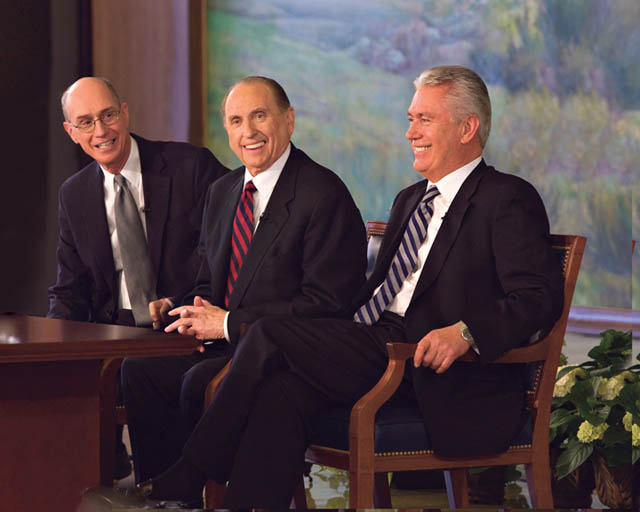 This is the fifth installment in a series of articles on Mormon prophets. The series is based on a talk given by Ezra Taft Benson, who was then a Mormon apostle. In the article, he outlines Fourteen Fundamentals in Following the Prophet.
This is the fifth installment in a series of articles on Mormon prophets. The series is based on a talk given by Ezra Taft Benson, who was then a Mormon apostle. In the article, he outlines Fourteen Fundamentals in Following the Prophet.
The fourth principle Elder Benson teaches is: Fourth: The prophet will never lead the Church astray.
When people hear Mormons say this, they sometimes like to play the “What if” game: What if the prophet tells you to rob a bank? What if the prophet tells you to commit suicide? The game demonstrates a lack of understanding of a very important principle in Mormon beliefs: the principle of personal revelation.
Mormons have the right and the responsibility to find out if the Mormons really do have a living prophet. Even children are taught to gain their own testimonies of this and to not rely solely on the faith of their family and friends. They do this by praying.
In James 1:5 of the New Testament in the Bible, James teaches that if we want to know something, we can ask God and He will tell us. Mormons believe God keeps His promises, so if they want to know if Thomas S. Monson, the current Mormon prophet at this writing, really is a prophet, they pray and ask God, the one person who really knows the answer and the one we can trust to tell us the truth.
Even after gaining this testimony, we have the right to return to God if the prophet says something we’re not sure about. We can ask Him if what the prophet has taught or wants us to do is really true. This prevents the prophet from being able to make us do something we should not do.
However, we also understand that a prophet of God will never ask us to do something that is wrong. Mormons believe suicide is wrong and so a prophet will not ask us to commit suicide. Mormons believe in obeying the law, so they won’t be asked to rob banks. It’s true that sometimes prophets ask us to do things we don’t always understand—Jesus asked someone to bathe in order to be healed, Noah asked people to board an ark, and Moses told people not to save their manna from day to day. However, even though these commandments might not have made any sense, God understood the reasons behind them and they were all valid requests. Sometimes we are expected to take things on faith, but we can always first turn to God to make sure this is a true commandment.
Do Mormons actually take the time to do this? They do. Children begin being taught to pray for a testimony when they are as young as four. They are strongly encouraged to do this prior to their baptisms at age eight, and in fact, are asked by their church leader if they’ve done so before they are approved for baptism. Even having done this at an early age, they are frequently reminded to do it again throughout their teen years and even as adults. Sometimes church teachings or actions surprise members and they turn to God yet again to gain a personal testimony of that new doctrine or action.
Mormons are taught to build a close and personal relationship with God, going to Him several times a day in prayer. As a result, they are in the habit of talking to God often and therefore it is natural to include this type of question in their prayer.
Mormons don’t recite a pre-written prayer. They are taught to pray from the heart, saying what comes to their minds. They thank God for their blessings, discuss their day with Him, and ask Him for whatever they need. It is meant to be a conversation and so, when they are finished talking, they are encouraged to stay on their knees and “listen” for an answer. The answer seldom comes in words heard with the ears. Sometimes the answers are an impression in the mind or a feeling of deep peace and comfort. Sometimes, direct words do come to the mind and on very rare occasions, some will hear a voice. We see examples of all these types of prayer answers in the Bible.
There are those who teach we must not ask God if something is true because we won’t know who is answering. However, Mormons believe in the Bible and trust what James taught as Jesus’ disciple. They believe that because God promised to answer our prayers, He is also capable of answering them in a way we can recognize as being true. After all, God can do anything. To suggest He cannot figure out how to let us recognize answers to prayer is to say He cannot do some things and cannot keep His promises. Mormons believe God will keep all His promises and that the more we pray and the better we know God, the more familiar His “voice” will be to us.
Will the prophet lead us astray? The people of the Old Testament were taught to follow their prophets without question, assured the prophet would not lead them astray. When they murmured or rebelled, they found their lives did not run smoothly. They were not just primitive people who didn’t know better. They were God’s children doing as they’d been taught and their prophets did not lead them astray. A prophet is only a prophet as long as he puts God before any other consideration. Therefore, he will only teach God’s word when issuing official instructions.
“Someone has said, “That person is not truly converted until he sees the power of God resting upon the leaders of this church, and until it goes down into his heart like fire.”
“I say to Israel, the Lord will never permit me or any other man who stands as president of this Church to lead you astray. It is not in the program. It is not in the mind of God. If I were to attempt that the Lord would remove me out of my place, and so he will any other man who attempts to lead the children of men astray from the oracles of God and from their duty.” (Discourses of Wilford Woodruff [Bookcraft, 1946], pp. 212–13.)
For those who play the “what if” game, then, the answer is clear. There is a set pattern a Mormon follows before deciding to do what a prophet has asked. First, he gains a testimony that The Church of Jesus Christ of Latter-day Saints is indeed God’s church. Next, he gains a testimony that God has restored prophets to the earth. Next he gains a specific testimony of the current living prophet. He does all these things by asking God and taking only God’s word for it, and by trusting God to keep His promise to tell us the truths we’ve asked for. Next, when he hears something he is not sure of, he goes to God directly to receive personal revelation on its truthfulness. An individual, other than the prophet, cannot receive revelation for the entire church, but he can receive personal revelation confirming what the prophet has taught. Finally, he has a responsibility to act on what he hears from the prophet once it is confirmed. Mormons do trust their prophets to guide them correctly, but only after a confirming witness from God.
About Terrie Lynn Bittner
The late Terrie Lynn Bittner—beloved wife, mother, grandmother, and friend—was the author of two homeschooling books and numerous articles, including several that appeared in Latter-day Saint magazines. She became a member of the Church at the age of 17 and began sharing her faith online in 1992.




